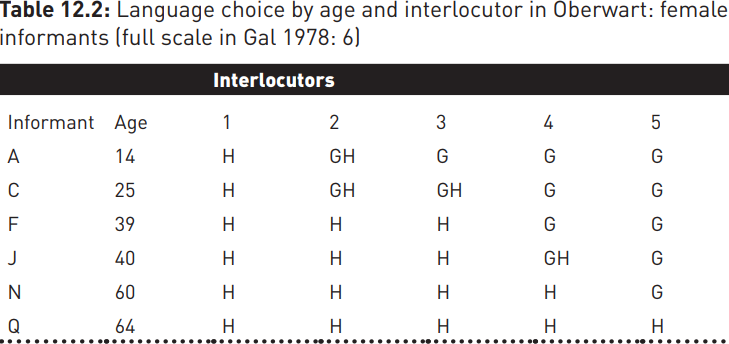


 Grammar
Grammar
 Tenses
Tenses
 Present
Present
 Past
Past
 Future
Future
 Parts Of Speech
Parts Of Speech
 Nouns
Nouns
 Verbs
Verbs
 Adverbs
Adverbs
 Adjectives
Adjectives
 Pronouns
Pronouns
 Pre Position
Pre Position
 Preposition by function
Preposition by function 
 Preposition by construction
Preposition by construction
 Conjunctions
Conjunctions
 Interjections
Interjections
 Grammar Rules
Grammar Rules
 Linguistics
Linguistics
 Semantics
Semantics
 Pragmatics
Pragmatics
 Reading Comprehension
Reading Comprehension|
Read More
Date: 2024-01-01
Date: 4-7-2022
Date: 20-6-2022
|
Language shift in Oberwart, Austria
After four centuries of stable German/Hungarian diglossia, the Austrian border town of Oberwart saw a decisive shift in favor of the H language, German, in the post-war period, as can be seen in the table below. The implicational scale of female speakers and interlocutors shows increased German use with all interlocutors among younger speakers, with only God still consistently addressed in Hungarian.

Key: G: German; H: Hungarian
Interlocutors: 1 = God; 2 = grandparents and their generation; 3 = parents and their generation; 4 = bilingual government officials; 5 = doctors
The shift in favor of German has been triggered by economic change. While German had become associated with the status of industrial worker, Hungarian was the traditional language of the peasant farmer. Until the Second World War, neither status dominated: while workers often had more disposable income, peasants enjoyed the security of land ownership. The post-war consumer boom, however, greatly improved living standards for salaried workers, undermining the relative prestige of the peasant farmer, whose lifestyle now acquired the negative associations of long hours of toil for relatively little reward.
As the two languages came to symbolize the changing statuses of the two lifestyles, bilingual speakers were able to exploit these associations metaphorically in language selection and code-switching: explaining to a neighbor how to fix a car in Hungarian, for example, might be perceived as a friendly tip, while the same information in German, the language of modernity and sophistication, would be taken as expert advice. A switch from Hungarian to German when reprimanding a child would signal a more serious tone, and indicate that the parent was now demanding compliance.
Language shift in Oberwart has no implications for Hungarian across the border in Hungary, where it is healthy, but in cases where shift leaves a language without native speakers it is appropriate to talk of language death. In most cases, death is slow and follows a period of ‘leaky’ diglossia. Only in extreme circumstances – for example, the extermination of 250,000 speakers of the Tasmanian language in the nineteenth century – does it occur suddenly and not from gradual erosion of its functions. Cornish and Manx, for example, both died because speakers increasingly began to use English in domains formerly reserved for the Celtic language, until eventually bilingual speakers chose to raise their children only in English, leaving the threatened language with no new native speakers. Languages never die out because they are somehow ‘not good enough’: they die because their speakers’ economic or other needs induce them to use a dominant language in more and more domains, leaving the obsolescent language with fewer and fewer functions.
|
|
|
|
التوتر والسرطان.. علماء يحذرون من "صلة خطيرة"
|
|
|
|
|
|
|
مرآة السيارة: مدى دقة عكسها للصورة الصحيحة
|
|
|
|
|
|
|
نحو شراكة وطنية متكاملة.. الأمين العام للعتبة الحسينية يبحث مع وكيل وزارة الخارجية آفاق التعاون المؤسسي
|
|
|